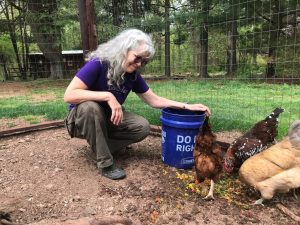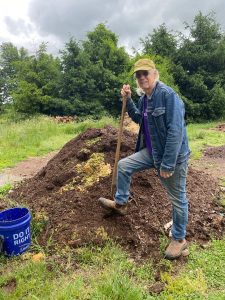One of the many advantages of small town living is that community comes naturally. With just a little pro-action and organization, we can start being the change we want to see in the world and experience the results on a small scale.
Case in point, the folks at Frenchtown Fresh, a family run vegetarian juice bar and restaurant on Race Street in the heart of Frenchtown, decided they’d like to see their food waste go to good use. Proprietor Betty Anne Bechtold knew that we kept a flock of chickens on Mad Lavender Farm. She suggested that we might like to pick up their 5 gallon buckets of scraps from their juice bar and feed them to our chickens. My husband Don and I loved the idea, as it really helps to support the “zero waste ideal” that we work toward on the farm. Feeding the chickens healthy scraps rounds out their diet nicely. Betty Anne and I tag team the effort; she drops off her buckets with us on her way home from work. We drop the empty buckets back off in Frenchtown.

The scraps that are not suitable for the chickens go into our compost heap. Because we add a lot of straw from our goat stalls into the compost, the food scraps heat up the mix and help to break the straw down more quickly into compost.

We started composting years ago and I cannot imagine throwing my food into the waste stream anymore! When we dine out at restaurant, we always take our scraps home for the chickens and/or the compost pile. Imagine what a truly sustainable system would look like in our towns, where organic matter was routinely diverted out of our waste stream and used to regenerate our soil and to better support organic farming. Healthy soil, rich in micronutrients, does not require the heavy doses of pesticides currently used by conventional farming methods to try to control insects. We face enormous challenges in shifting to more sustainable practices in our communities and a grassroots effort, involving incremental changes, can help to start to make the difference.